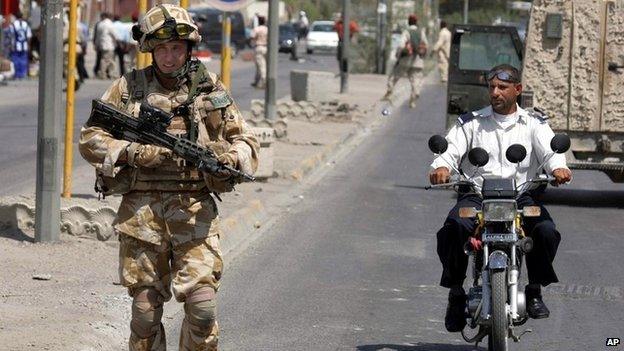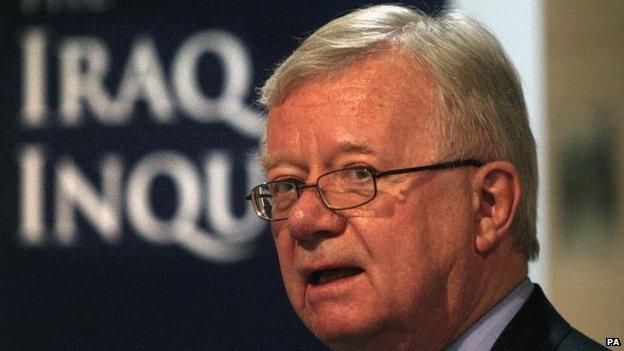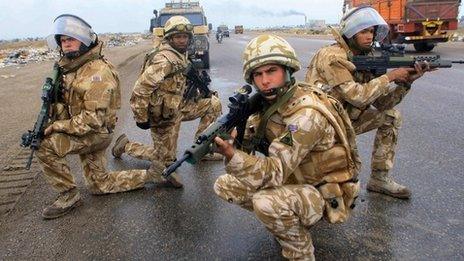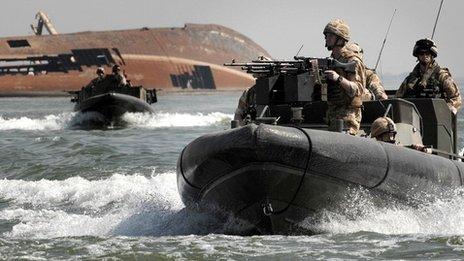Iraq Inquiry: MPs criticise delays to Chilcot report
- Published

MPs have expressed their frustration at the time being taken to publish the official inquiry into the Iraq War.
The inquiry, which began its work in 2009, has said its final report will not be published before May's election.
In a Commons debate, former Attorney General Dominic Grieve said the delays were "very regrettable" as MPs of all parties criticised the process.
Sir John Chilcot, the former civil servant who heads the inquiry, is to be questioned by MPs next week.
Between 2003 and 2009, when foreign troops left Iraq, 179 UK military personnel lost their lives while thousands of Iraqi civilians are believed to have died over the period.
'Public unease'
Sir John Chilcot has yet to explain the reasons for the delay to his inquiry says former Home Office minister Norman Baker
Opening the debate, which was organised by the Commons Backbench Committee, former shadow home secretary David Davis said the invasion had done "untold damage to the reputation of the West" and "destroyed the integrity of the Iraqi state and triggered a persistent civil war" in the country.
He said lessons from the conflict would have been beneficial in subsequent "major foreign policy decisions" relating to Libya, Syria and again in Iraq.

Sir John Chilcot has led the inquiry for six years
Mr Grieve said the drawn-out process would lead to a public "unease", adding that he believed Sir John was "trying to produce an extremely thorough report".
Labour MP Jack Straw, who was foreign secretary at the time of the invasion, said criticism of the delays could prompt inquiry members to change their conclusions.
As the months go past, he said, "wholly unfounded suspicions fall on the inquiry about a whitewash.
"And in equal and opposite concern that they may feel obliged to respond to these pressures by conclusions more starkly drawn than the evidence would allow."
Lib Dem former minister Norman Baker said delaying the report until after the election was "an insult to the British people".
Replying for the government, Cabinet Office Minister Rob Wilson said it would be "very helpful" for Sir John to indicate when the report might be completed.
At the end of the debate, MPs agreed to a motion asking the inquiry to set out a timetable for publication and an explanation of the causes of the delay by 12 February 2015.
The Scottish Parliament also held a debate on the Iraq Inquiry on the same day. First Minister Nicola Sturgeon said the failure to publish the report before the election was "scandalous", saying it was "time for the truth" on the events leading up to the 2003 invasion.
'No realistic prospect'
Prime Minister David Cameron has said he is frustrated at the length of time the inquiry is taking to publish its conclusions but that it is independent of government and it would be wrong of him to intervene.
Sir John recently said there was "no realistic prospect" of the report, likely to be more than a million words long, being released before the general election on 7 May.
Appearing before a parliamentary committee on Tuesday, the UK's top civil servant, Sir Jeremy Heywood, urged MPs not to try to subpoena the report or try to compel the inquiry to publish some of its findings before 7 May.
He said he understood public anxiety but it would be wrong to "rush" its publication at such a crucial juncture.
While agreeing to appear at the Foreign Affairs Committee on 4 February, Sir John has said he will not disclose anything about the substance of the inquiry's work, anticipate the eventual date of publication or comment on the current process in which those provisionally criticised in the report are being contacted to give them a right to respond.
In a statement, the inquiry said "it had worked in strict confidence in the course of drafting its report" and reiterated the longstanding position "that it would not give a running commentary on its work".
- Published27 January 2015

- Published5 July 2016
